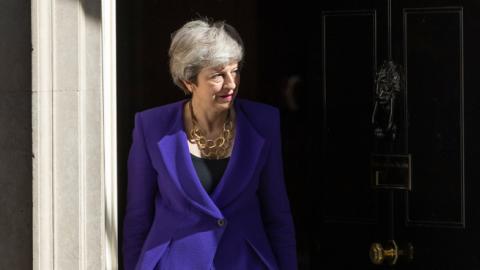While the rest of the world was ogling the latest royal baby last week, a major scandal was erupting in the halls of Her Majesty’s Government. That scandal may seem remote to us here in the U.S.: especially when we have so many scandals of our own to choose from.
But in fact the issue may decide whether the United States or China leads the world in advanced technology in the 21st century: and whether a key person in deciding that issue, prime minister Theresa May, stays in office.
The scandal has to do with the firing of U.K. defense minister Gavin Williamson on the first of this month, for allegedly leaking secret information from Britain’s National Security Council. And while it’s Theresa May who’s forced Williamson out, it’s May herself who should be on the way out. Right now she poses a threat the U.S. and U.K. “special relationship”—as well as the future of Britain--like no prime minister since Lord North.
One reason why she needs to leave hinges on her mishandling of Brexit, or Britain’s departure from the European Union, where her leadership has been more than dismal. But she has also bungled an issue of vital American interest, and the interest of what remains of the free world: namely whether Britain will join the growing crowd of nations (almost seventy at last count) who have sold themselves on letting the Chinese telecommunications equipment giant Huawei build their future 5G wireless networks.
As we’ve pointed out numerous times in this column, fifth generation or 5G wireless technology represents the future of telecommunications. It is faster, more powerful, and will be more ubiquitous than any current system, and will service everything from the Internet of Things and smart cities to driverless cars. It’s no exaggeration to say that whoever controls the 5G will control the world’s economy for the 21st century.
China is now poised to win that control, with Huawei serving as their Trojan Horse by promising to build 5G networks at an appealing low cost to more than 65 countries, including several US allies and now Britain—networks which experts agree will be highly vulnerable to Chinese snooping and spying, as well as network disruption and data theft.
That’s what this notorious leak is really about. The leaker (and Williamson has strenuously denied being the culprit) was trying to expose how Theresa May was handing over Britain’s wireless future to China.
Government leaks are rare in the U.K., where the Official Secrets Act stays the hand of would-be blabbermouths (or would-be whistle blowers depending on your perspective). Leaks from an ultra-secret body like the National Security Council are unprecedented—hence the uproar news of the leak has aroused.
But the furor over the fact of the leak, has obscured the importance of what it was about.
That was the May government’s decision to let Huawei build some of the core of Britain’s 5G networks. This, despite Huawei’s abysmal track record as alleged cyber thief and willing tool of the Chinese military and intelligence services (allegations Huawei continues to deny). The worry is that allowing the Chinese telecom equipment giant to build, supply, and maintain 5G could give Beijing backdoor access to data and networks that today are largely carried on the Internet but will in the future will be on 5G—including data from government agencies and financial services, including our own.
The May government has blithely chosen to overlook this threat, despite repeated U.S. warnings and concerns from her own security agencies. Even worse, the head of Britain’s National Cyber Security Centre (NCSC) gave May a fig leaf for her lack of caution by announcing that any threat Huawei posed to the nation’s telecom infrastructure could be contained. This, even though his own tech director has signaled that Huawei hasn’t dealt with past security concerns, while telecom conglomerate Vodafone, one of Huawei’s biggest supporters, admitted last month that serious security flaws were found in the equipment Huawei has provided in the past (Vodafone claims it fixed the problems).
But others in the British clearly have not been fooled by these specious assurances. And the leak itself is a sign that May’s authority in her own government is practically nil.
Admittedly, much of her lack of credibility stems from her failure to manage Brexit. But her mishandling of the 5G issue has not helped. Her support from her Conservative colleagues has ebbed to the point that her departure, like President Maduro’s from Venezuela, is largely a matter of time.
That time has to be now.
It will point the way to a fresh look at a Brexit strategy, from a successor who can carry it out with clean hands.
But it will also allow a fresh look at the 5G Huawei mess, which in the long term may be even more significant. Because if the U.S. decides it can’t share data and networks with British telecom carriers, as Secretary of State Pompeo has indicated, then China will have driven the first important wedge between the US and its World War Two ally, since the Suez crisis more than sixty years ago.
It may be true that commercial 5G networks won’t be used for classified or sensitive government and defense information. But will be for unclassified; and there are plenty of other uses of this advanced wireless technology—so much faster and more powerful than today’s existing networks—that will impinge directly on national security, and will face the potential threat of Chinese espionage or disruption.
In the end, no prime minister in living memory has potentially done more damage to the US-UK relationship than Theresa May. Her party, and the British public, needs to repeat to her Oliver Cromwell’s words to the Rump Parliament: “You are grown intolerably odious to the whole nation. You were deputed here by the people to get grievances redressed, now are yourselves become the greatest grievance. In the name of God, go!”


















